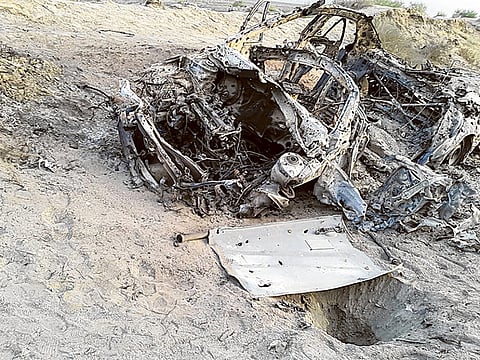Peace is the casualty in Afghan killings
Public in Pakistan and leadership in private, remain suspicious of US motives and believe that protestations of friendship are hollow

The killing of the Taliban Chief Mullah Akhter Mansour in a US drone attack for ‘his refusal to talk peace’, in the Pakistani province of Balochistan last week complicates Pakistan-US relations further. It will have a direct bearing on the search for elusive peace in Afghanistan that has remained in a state of war since 1979. The Taliban who represent the Afghan resistance against the foreign military presence in their country chose a new leader, Haibatullah Akhundzada, who also vowed in a radio message “… we will not come to any type of peace talks.” In addition to the usual protest for “violation of Pakistan’s sovereignty” to American ambassador by Pakistan’s Foreign Ministry the Interior Minister Chaudhry Nisar, warning of “serious implications” for Pakistan-US relations, declared the attack “against international law.”
More importantly, when the American ambassador called on the Army Chief General Raheel Sharif on May 24 he heard the General say: “Such acts of sovereignty violations are detrimental to relations between both countries and are counter-productive for the ongoing peace process for regional stability”. The benchmark of Pakistan-US relations historically is America’s relations with the Pakistan Army.
The quadrilateral dialogue process comprising Afghanistan, Pakistan, China and the United States launched in August last year is now dead. The Taliban team attended the first round of talks in July last year. Talks stalled after the Afghan security agency disclosed the death of Mullah Omar, the former Taliban chief two years ago. The Americans and the Afghan interlocutors were not prepared to concede even the minimum of goodwill to facilitate further Taliban participation. There are widespread fears that Taliban will build on their military gains during the summer offensive.
Pakistan did not read the signals of the US and Kabul’s exhaustion with the Taliban’s refusal to negotiate peace on the terms of the occupying forces. The Kabul regime, after a short bonhomie with Pakistan, has become increasingly strident towards Islamabad. In what is considered a tit for tat policy the Kabul government provides sanctuaries to the Pakistani Taliban, who launch deadly operations inside Pakistan, including the December 2014 Peshawar school bombing.
The Americans, failing to meet their objectives, and already into their longest war, have been tightening where it hurts Pakistan most — money and military equipment. Wary of the Taliban battlefield successes the American opinion makers including retired General David Petraeus, the former commander in Afghanistan recommend “we need to take the gloves off these [US] forces already in the country.” Military commanders are seeking greater leverage in deploying air power to quell Taliban advances.
Kabul’s dilemma
Notwithstanding Pakistan’s two-year-old military campaign in the tribal regions with over 5,000 military men dead, America remains unsatisfied. The US Congress has imposed restrictions on the release of hundreds of millions of dollars in reimbursements due to Pakistan out of the Coalition Support Fund unless the administration certifies fulfilling certain conditions. The US wants Dr Shakil Afridi, a traitor under Pakistani law, who helped track Osama Bin Laden through a fake vaccination campaign, released from detention. And ominously for Pakistan’s security, the US Congress wants Pakistan to discontinue its long-range missile programme and stop producing tactical weapons. Fearing an ever-increasing Indian arms buildup and the US courting India, Pakistan cannot accept such a restriction on its weapons development programme.
For the Taliban, the face of Afghan resistance, the equation is simple. They consider the government installed by America in Kabul as illegitimate. They want all foreign forces out and then they want to settle it among the Afghans themselves. The Kabul regime’s dilemma is that in spite of billions poured in, it is unable to sustain itself without American military support. Their interests are therefore dependent upon a foreign military presence. Pakistan-US relations have been on a roller-coaster ride since the independence of Pakistan. Obsessively centred on India, Pakistan has always been at the US’s call, mistakenly hoping that the superpower will provide security against its nemesis — a belief first shaken when the US provided military supplies to India against China in 1962.
To Pakistan’s dismay, the US continues to woo India, keeping relations with Pakistan transient and almost entirely security based. Both sides assumed different outcomes in relations to what these have turned out to be. For the US, it is straightforward — expecting services from Pakistan in lieu of money. These relations are strong whenever the military has directly been in charge in Islamabad. Much of Pakistan’s current problems stem from its military rulers embracing US goals in Afghanistan. And Pakistan was jettisoned everytime the US purpose was fulfilled. From Pakistan’s perspective, the story of Pakistan-US relations is that of ‘American betrayals.’ The public in Pakistan and the leadership in private remain deeply suspicious of US’ motives and believe that American protestations of friendship are hollow and that it is forcing Pakistan to support its objectives in Afghanistan. With a badly enfeebled economy Pakistan is virtually a hostage to international moneylenders where America has a huge leverage. The grudging relations will continue. On Afghanistan, much still depends on how deftly Pakistan plays its cards and holds out till the US withdrawal or falling of the Kabul regime, whichever happens first.


